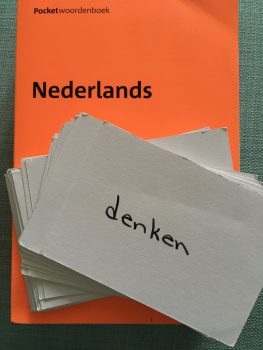Fun ways to learn new vocabulary Posted by Karoly Molina on Jun 16, 2017 in Dutch Vocabulary
Learning vocabulary can be quite a task if you are not constantly using these words. I find particularly hard to learn onregelmatige werkwoorden or irregular verbs because well….they are irregular! However, with a little creativity and some old-fashioned studying, you can tackle the new words you want to learn.
Below is a list of 5 useful ways to learn new vocabulary!
Flashy Flashcards
Flashcards are one of the most “old-school” methods for learning new vocabulary. You write the target language word on one side and the translation on the other. For irregular verbs, I write the infinitive form on one side and the conjugations in the past on the back. When I was just starting to learn Dutch, I would work on 5 new words every few days and during breakfast and dinner, my husband would test me. As I progressed, I put aside the words I already knew and kept on working on new ones.
The trick with flashcards is to make some sort of connection to something. You can repeat denken, dacht, dachten, gedacht as much as you want, but if you do not associate it with something, you will never internalize it. Uit het hoofd leren is niet leren! My suggestion here is to end the repetition of the conjugations with a sentence that truly makes sense in your life. The more fun the better!
Alliteration
Like I said, making associations is key to learning new vocabulary. Do you remember that introduction game your teachers used where you had to choose an adjective that started with the same letter as your name and introduce yourself like that? Try that with new words you learn! It can be as obvious as leerling leren to more personal and less obvious connections.
You can also make this association for the ending of words. I, for example, always mixed up the Belgian cities of Ghent and Genk. I could never remember which one was which until I associated kortbij with the ending of Genk (because it is nearby where I live).
Keep a Diary
Another useful way to practice new vocabulary is by keeping a diary. If you learned a new word during the day, you get to put it in practice when you journal that experience. It is also useful for word order and practicing the past tense. A tip I gave myself that really helped me avoid fossilizing recurring mistakes was to keep my sentences simple and double check spelling with a dictionary. The beauty of keeping a diary is that you reduce the pressure of making mistakes because it is personal and, if you do it on a regular basis, you are creating a recurrent learning experience in the target language. If you are not a fan of keeping a diary, you can work on making lists (trying to use full sentences) of things you are grateful for, funny experiences, what you ate, or even just a schedule of your day.
Sing it!
Who isn’t guilty of singing in the shower, while driving or cleaning? Singing is a great way to learn new words and phrases because the music actually helps your brain remember it. Did you hear a catchy song on the radio? Look up the lyrics and sing along! One of my favorite Dutch songs for singing out loud is Rood by Marco Borsato. I personally do not like his music but for some reason, I really really really enjoy singing this song full blast and getting every word in the part where he goes fast is always a challenge.
Make it visible!
Seeing is learning! Constantly seeing a certain word or phrase helps you remember it better. Take advantage of good learning places around your home such as mirrors to write new words and phrases. Before I even started with Dutch classes in Mexico, Riccardo wrote a few phrases and words on the mirror of my bedroom so I could begin practicing. It was so useful to see these words and practice while I was doing my hair or getting ready for bed. Put post-its on appliances, write on your mirror, keep a notecard in your car and even put one on your desk at work! Seeing will help you learn it!
Last week I read a great article about a refugee who really wanted to learn Dutch so he wrote new vocabulary and put it all around his home as if it was wallpaper! Who would have thought a new language could even be considered home decor!
If you want to learn new vocabulary in Dutch, sign up to receive the Dutch word of the day!
How have you learned new words in Dutch or in any other language?

Build vocabulary, practice pronunciation, and more with Transparent Language Online. Available anytime, anywhere, on any device.





Comments:
PapaVanTwee:
I’ve used Duolingo. It’s not bad and helped expand my vocabulary a little. My wife bought me some books early on, but I would get through about half of it, then get frustrated and quit. It would help if I lived in the Netherlands, but I’m in the US, so I will never NEED to use Dutch.
mad tony:
@PapaVanTwee Tru….but if you want to find a different culture…